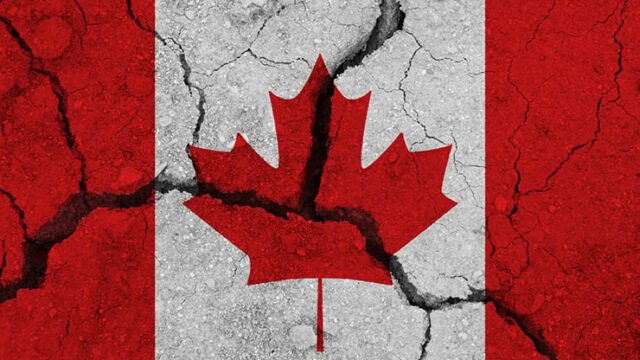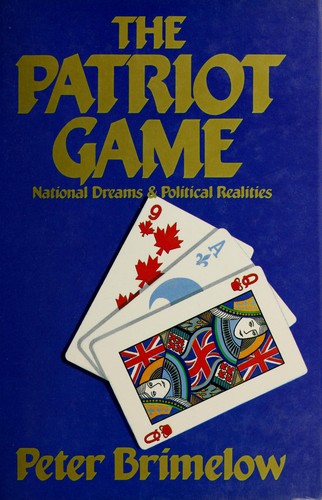Donald Trump Has Triggered a ‘Time of Troubles’ for Canada

I read with interest Neema Parvini’s “The Mark Carney Paradox” in the June/July issue of Chronicles. Parvini contends that, in the recent showdown over tariffs between Canadian Prime Minister Carney and U.S. President Donald Trump, Carney is “winning” and “getting his way.”
That may be what it looks like from an outside perspective. And, goodness knows, many Canadians would like to think so, too.
However, the reality is that Trump’s rhetoric about tariffs and threats to add Canada as the 51st state have plunged Canada into a “time of troubles” that may administer the long-postponed coup de grâce to Canada’s fragile national unity.
And if Canada is indeed entering a time of troubles, then the upcoming 50th anniversary of the publication of Peter Brimelow’s 1986 The Patriot Game deserves special attention.

As Brimelow predicted back in 1986, Canada was living on borrowed time. It could “blunder on” for a long while, he conceded, but eventually “something terrible” would happen that would trigger a national crisis.
Perhaps “something terrible” has finally arrived, in the person of Donald Trump.
Trump’s election was all that was needed to accelerate an already-brewing Canadian crisis stretching back to 2024 and surrounding then-Prime Minister Justin Trudeau and his highly unpopular Liberal government in Ottawa. Trump’s victory in November 2024 set the stage for the headline-grabbing Dec. 16, 2024, resignation of Trudeau’s Minister of Finance and Deputy Prime Minister Chrystia Freeland. Then, on Jan. 6, 2025, Trudeau announced he would step down as leader of the federal Liberal Party when it chose his successor in March.
As party leader, the Liberals chose Mark Carney, the Canadian-born former director of the Bank of England, who then led the Liberals to victory in the federal election on April 28, 2025. The national media triumphantly hailed the election as the most important in Canada’s history. But, as Brimelow has written, Canadian federal elections “are a Canadian version of Russian roulette. One day, Confederation may get shot.”

The 2025 election results suggest Canada may have dodged a bullet, but Carney’s victory merely hides a wide range of problems that show no signs of abating. Carney’s Liberals fell short of winning a majority government. As Ken Coates of Ottawa’s MacDonald-Laurier Institute argued on May 26, 2025, the federal election was a “losers’ election,” in which every single political party fell short of their expectations. Carney’s minority government faces daunting challenges of building a coalition in a country with competing and often irreconcilable differences; for example, between provinces like oil-rich Alberta, nationalist Québec, and the country’s industrial heartland in Ontario. The addition of Trump’s tariffs and a crippling federal debt load have created an almost insurmountable challenge for Carney.
The phrase “time of troubles” refers to the era in Russian history when the country was wracked by foreign meddling, elite feuding, and lower-class unrest. Russia’s Time of Troubles came to an end in 1613, when its desperate nobles begged a none-too-enthusiastic Mikhail Romanov to assume the throne and quell Russia’s disunity. Romanov agreed to become Tsar and thus inaugurated a 300-year dynasty.
The question staring today’s Canadians in the face is how on earth to end its own pending “time of troubles,” characterized by foreign interference, acute regional and demographic divisions, escalating Indigenous land claims that threaten individual property rights, and mounting protests against glaring economic inequality.
In other words, thanks to Trump’s shock treatment, Canada in 2025 may have reached the tipping point predicted by Brimelow’s incisive 1986 book. As Brimelow and various Québec nationalists such as René Lévesque, Lucien Bouchard, and the separatist Bloc Québecois party have contended over the years, Canada isn’t a real country. Its inherent lack of unity can’t be solved within the existing Confederation.
In Brimelow’s words, “Canada is merely a geographical expression,” shakily held together by a dominant ideology (the “patriot game” of the book’s title) championed by the federal Liberal party and the country’s elite classes. The “patriot game” is the myth that the Liberal Party of Canada is the party of national unity. Brimelow wrote that Canada’s Liberal establishment deploys the “patriot game” to hide the fact that national politics is instead “the projection of internal Québec concerns onto the national stage.” The volatile nature of Canadian politics since the 1990s, with the rise and fall of numerous political parties at the provincial and national levels, is an indication that growing numbers of Canadian voters have slowly awakened to this reality.
Indeed, Canada is afflicted with fundamental regional, economic, linguistic, and demographic contradictions that, as Brimelow predicted, can plunge the country into crisis at a moment’s notice. Canada’s political leaders have assiduously tried to paper over these divisions in the face of growing voter unrest. But Canadian politics have been further “embroiled in a tangle of pathologies” in the years since Brimelow’s book was published.
Meanwhile, journalists have noticed how Trump’s messaging has had a bone-chilling effect on many Canadians.
In late December 2024, the Washington Post reported that the Canadian government was “melting down” in the face of Trump’s “taunts” and threats to apply 25-percent tariffs to imports from Canada. Globe and Mail columnist John Ibbitson claimed that Trump’s actions have made Canada look like “a failed state” without a “functioning national government.” In early 2025, New Brunswick’s Telegraph Journal editorialized that Trudeau’s refusal to resign until Jan. 6, 2025, had “set the country adrift for three months.” In late January 2025, the Financial Post’s Diane Francis told Canadians not to blame Trump for, as she put it in the headline of her column, “An Existential Crisis of Canada’s Own Making.” It was made in Canada by the Trudeau Liberals, she insisted.
David Staples wrote in the Edmonton Journal on Jan. 3, 2025:
Trump isn’t picking an insult out of the air. Like the predator in business and negotiation that he is, he’s zeroed in on a long-standing weakness of Trudeau, his nation-crushing notion of putting the interests and preoccupations of international elites and outsiders over those of everyday Canadians.
Trump’s tariff threats have created what two Royal Bank of Canada economists call the largest trade shock to Canada in a hundred years. As of September 2025, Canada has yet to sign a new trade deal with Trump’s White House and reels from the effects of Washington’s 50 percent tariffs on all steel and aluminum imports.
If Trump’s threats have thrown Ottawa and the provinces into chaos, the news is likely to get gloomier going forward.
Carney managed to win federal seats from the separatist Bloc Québécois, but Québec’s separatist provincial party, the Parti Québécois, is surging in the polls. Its leader promises that if it wins the next provincial election, as is likely, it will call a referendum on sovereignty. By contrast, the federalist Québec Liberal Party is moribund.
Meanwhile, Ottawa’s weakness in the face of Trump’s threats has brought renewed calls from oil-rich Alberta and Saskatchewan to claim provincial jurisdiction over more policy spheres. As 2024 came to an end, Ontario Premier Doug Ford all but assumed leadership over the provinces’ efforts to negotiate with the U.S. president-elect over trade and border security. Ford called (and won conclusively) a snap provincial election to address “the lack of leadership at the federal level.” As of September 2025, Ford’s Ontario had lost 38,000 jobs due to Trump’s tariffs, many in manufacturing.
In 2025, Alberta Premier Danielle Smith is also emerging as a compelling spokeswoman for Canada’s national energy sector. Pundits predict that support for Albertan separatism will mount if Carney doesn’t endorse nationwide pipelines for shipping prairie oil and natural gas, something Québec’s elected officials have blocked for years.
Like Russia in the early 1600s, Canada also faces a crisis over foreign meddling. On Jan. 28, 2025, a government commission dropped a bombshell report on foreign interference in Canadian elections. Based on months of hearings, testimony, and the examination of classified documents, the judge who led the commission concluded that, “Trust in Canadian democratic institutions has been shaken.” She held the Trudeau government responsible, stating that it had taken “too long to act” against attempts by China and India to meddle in Canada’s elections. Duff Conacher, founder of Canada’s Democracy Watch organization, alleged the report likely underestimated the full extent of foreign interference.
There is also the mounting uncertainty surrounding relations with the country’s 630 First Nations communities. Canadians may think that their governments are trying to settle the natives’ long-standing land claims disputes by respecting the rights of all Canadians, but a recent agreement with the Haida First Nation in British Columbia bodes ill for the Canadian future. The B.C. provincial government, with Ottawa’s backing, has transferred 10,000 square kilometers of the province to Haida ownership.
The agreement has been celebrated in international circles as a model for settling Indigenous land claims. In the face of similar court cases around the country, however, non-Indigenous Canadians may not be so thrilled.
Still, it is possible that this Trumpian moment in Canadian politics will pass, as did Canada’s near-death experience during the narrow federalist victory in the 1995 Québec referendum. As Brimelow told us in his book, Canada might “blunder on” into the future. There is no way of knowing how long its many “pathologies” will fester.
But the medical metaphor is apt: the symptoms may be in remission, but the pathologies remain. America’s neighbor to the north is living on borrowed time, and its next crisis may be just around the corner. By any Canadian standard, Mark Carney is not “winning.”
